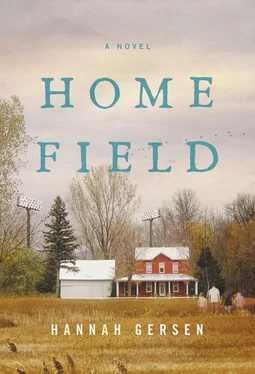“Antietam sounds familiar,” Theresa’s father said politely.
“It was the single bloodiest day in American history,” Stephanie said, emphasizing the word bloodiest . She had the perverse desire to shock these people, who seemed almost pathologically sensible with their healthy snacks and thick-soled shoes.
“Do you like the Indigo Girls?” Theresa asked Stephanie. She held up their debut CD with an expression that hoped so earnestly for approval that Stephanie felt embarrassed — for herself or Theresa, she wasn’t sure. She gave a thumbs-up but then excused herself, leaving her suitcase open and half-unpacked.
The hallway was crowded with parents and younger siblings, the parents either busy or trying to seem busy. Some were beginning to depart, giving long hugs, their expressions frankly sorrowful. One girl sneezed as she was saying good-bye, and when her mother handed her a tissue, she lost it completely. Stephanie was glad her father and brothers had not accompanied her. It would have been awkward with Robbie and Bry getting bored and her father not knowing what to say. She was glad they hadn’t come and yet she kept imagining her brothers playing in her dorm room, sitting cross-legged on the bare linoleum floor and flicking a paper football back and forth between them.
Outside, more families were spread across the freshman quad, the grass Crayola green, the border gardens freshly mulched, the tall oaks and elm trees casting generous shadows, perfect for reading and contemplation, as well as for farewell conversation between parents and children. No one noticed Stephanie as she walked by. She felt like a ghost. And in the days that followed, her sense of alienation only deepened. She kept meeting people from Maryland, but they were always from Columbia or Chevy Chase or Silver Spring or some other blandly named place near a Metro stop she didn’t know. Her classmates’ Maryland was a suburb of D.C.: international, professional, secular, well-to-do. Her Maryland was small-town: rural, blue collar, evangelical, down-at-the-heel. Their Maryland was the Maryland that she and Mitchell fantasized about living in, a Maryland where no one would say Where’s the funeral? if you dressed all in black. Her Maryland was their place of exile, a place she had longed to get away from. A place she now missed dearly.
She set up her e-mail account and wrote a message to Mitchell with the subject line Nostalgia’s a bitch . He was the only person she knew with e-mail. When a couple of days passed and he hadn’t written back, she thought maybe he hadn’t checked his account yet. But that wasn’t like Mitchell. He loved anything to do with computers. Maybe he was busy. Maybe he was already happy. Maybe he’d made new friends.
Or maybe he was out by himself, enjoying Boston, reveling in his independence, going to whatever movie he wanted, listening to whatever music he liked. Stephanie didn’t know why she couldn’t enjoy her freedom. She missed the rigidity of her summer. She hadn’t understood how comforting it was to take care of her brothers. She had to keep reminding herself that she had earned the right to be at a school so nice, that she’d sacrificed nights and weekends to get the right grades, to participate in the right extracurricular activities. And yet these were the same things that had pushed her away from her parents, especially her mother.
When classes started, Stephanie threw herself into the selection process, sitting in on two or three lectures a day. But that only made her feel more like a ghost as she sat in one-armed desks in crowded classrooms and took notes on subjects she doubted would end up on her schedule. The only class she knew for sure that she would take was Psych I. It was full of first-year students, and when she went to the used section of the bookstore, she was disappointed to find that secondhand copies of the required textbook had already sold out. At the same time, she was pleased to have an excuse to purchase a new copy. The pages were clean, unmarked by anyone else’s highlights and underlining, a stranger’s idea of what was important to remember. In the safety of her room, Stephanie turned to the chapter devoted to depression, skimming until one paragraph stopped her, forcing her to read slowly:
Postmortem examinations indicate that suicide victims have low levels of serotonin throughout the brain. Decreased levels of serotonin are caused by stress and increase stress, which in turn increases aggressive behavior — the “fight or flight” instinct. Suicide can be seen as an aggressive behavior against the self.
It had never occurred to Stephanie that her mother might be characterized as “aggressive.” For Stephanie, the emblematic moment of her mother’s depression was a cold winter morning when she came down to breakfast to find her mother standing stock-still at the kitchen counter, staring at a lemon on the cutting board, staring at it like it was a Rubik’s Cube. When she finally noticed Stephanie watching her, she asked Stephanie if she wouldn’t mind quartering the lemon for her, because she needed to drink her black tea with lemon and honey, and it was somehow too difficult to find the right knife and to hold the lemon still and to wield the knife precisely enough to slice it into pieces. What could Stephanie do but cut the lemon? But when Stephanie drove to school, she had to pull over to the side of the road because she couldn’t stop crying. She remembered the frost on the windshield that morning. It had given the window a cracked appearance. For the first time she understood that whatever was wrong with her mother was not just “in her head.” It was in her body, too.
Stephanie shut her brand-new textbook and impulsively called her father, even though it was early in the evening and the long-distance rates would be expensive.
“Stephanie! How are you, sweetheart?”
“Okay. I was just calling to say hi.”
“We’re actually heading out. There’s a team dinner — pizza night in the gym. You know how that goes; I have thirty pizzas showing up. But tell me how school is. Real quick. Have you picked your major yet?”
“You don’t declare your major until your sophomore year.”
“Oh, right. I wouldn’t know. I majored in football.”
“That’s not an option here,” Stephanie said, her voice going tart. She couldn’t help it; her father was being so breezy, it was as if he wasn’t even sad she was gone.
“You’re going to be the intellectual of the family. Listen, I have to go—”
“Wait, how are Robbie and Bry?”
“Oh, they’re good, they’re good. Getting more independent, which is good. They got your postcards. I told them to write back.”
“It doesn’t matter, they’re just kids.” Stephanie wondered what her father meant by “more independent.” He was probably leaving them on their own too much. Dragging them along to every practice. Making them babysit themselves. She knew what it was like to be the football coach’s kid. But she’d always had her mother.
She hung up the phone. Never in a million years would she have guessed that college could be lonelier than high school. She couldn’t stay in her room any longer; she couldn’t risk running into Theresa, who would no doubt invite her to some boring, tame event for whatever boring, tame club she was thinking of joining. Stephanie gathered together her new books. She would go to the library and study. She would just be that person, the same person she was in high school, escaping into academics.
Outside, the sun was setting. It was Friday night, the first official weekend of college, with all the students now on campus, not just the first-years. The dining hall was busy and noisy. Stephanie grabbed a to-go sandwich and an apple and left without saying boo to anyone — as her grandmother Geneva would say.
Читать дальше












